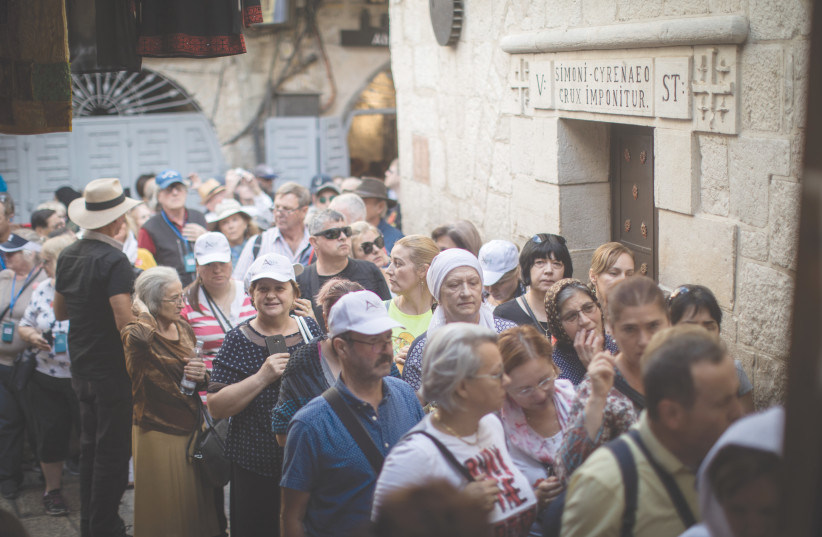The longer I live in Jerusalem, the more it seems that every time you turn a corner – especially in the Old City – you run across an amazing story, and Razzouk Tattoo, a new documentary by Orit Ophir Ronell, on Kan Digital 33 on Monday at 8 p.m. (available after that on the Kan Digital website www.kan.org.il), confirms this theory.
The movie tells the story of a tattoo parlor in the Old City run by a Coptic Christian family that for 500 years has specialized in tattooing pilgrims who use the tattoos to commemorate their journey. But that is only the beginning.
It turns into the saga of a family torn apart by feuds – which may have led to a murder – in the secretive world of professional tattooing. A branch of the Razzouk family descended from a master tattoo artist has had to cope with jealousy, intrigues and even the theft of unique stamps used in the tattooing process by other family members.
Those not particularly enamored of the idea of tattooing should not be put off by the premise of the film. The intricacy of the designs on the tattoo stamps, some of which can be traced back hundreds of years, are beautiful and it is clear that the Razzouks are truly artists. The Old City looks mysterious and inviting in this film.
Ronell found her way into the story by accident. She has worked with special-needs and at-risk youth, as well as conducting research for broadcast outlets. She has made two previous documentaries about families: Orphans, about a family recovering from a terror attack in which several of its members were killed; and The King of Borek, a movie about her Bulgarian family and their ups and downs in the bakery business. In Hebrew, her film is called Seret Bourekas, a play on the Hebrew expression for lowbrow Israeli comedies.

When she thought about making a third film, she was sure of one thing: “I did not want to make another movie about a family.” The Razzouk dynasty, however, took her by surprise. She first learned about them while doing research when Prince William visited Israel and she discovered the centuries-old tradition of tattoos for pilgrims.
THE RAZZOUK Tattoo parlor, located in a small store near the Jaffa Gate, adorned with a wooden sign that says, “Tattoo with heritage since 1300” underneath the name. It is run today by Wassim Razzouk, who is part of the family’s younger generation. “I felt the spirituality of the people who do tattoos,” she recalled. Prior to the coronavirus, when Ronell started working on the film, she said, “It is a small store, always packed. The pilgrims go to it. They are not dressed like religious people, but like regular tourists, but they have gone through deep, spiritual experiences and their heart opens when they get the tattoos... When I went into the store I felt I was in a different world.”
But she soon learned that the pilgrims were only part of the story. “Wassim is very charismatic and an interesting person.” One of the truisms of documentary filmmaking, she said, “Is that interesting things happen to interesting people.” She got to know his family, who live in Beit Hanina “and I was drawn into the story. I found out that he didn’t know where many of his grandfather’s stamps had gone.”
She learned that many of the Razzouk family stamps which his grandfather had used had disappeared, and that he suspected they were with his aunt, Georgette, in Beit Jala. The movie focuses on this mystery as Georgette is interviewed and the story of the grandfather’s generation is gradually revealed. The movie explores stories of Wassim’s great uncle, a far less skilled artist than his brother, whose envy turned violent, and who abused his family. There are suicides and even what seems like a murder.
In the course of the film, Wassim reconnects with Vida, his cousin who is from the estranged branch of the family. Vida is a glamorous and wistful presence who speaks movingly about trying to reconcile with her bitter and violent father at the end of his life. “We were blessed that Vida got into the story,” she said.
In the end, Ronell found that the Razzouk’s story, while superficially so different from her family’s, had many key similarities. “I thought I wanted to get away from the story of my family, but it was actually so close. The treasure [of the tattoo stamps], instead of bringing good to the family, brought trouble. What should have been a blessing became a curse.” But it is a curse that the younger family seems to be conquering, through forgiveness and tolerance.
To learn more about the movie, visit the Instagram account: razzouk_tattoo_the_film
